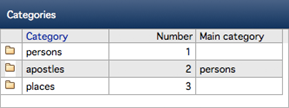 |
Coder Options
In the menu MAXDictio > Options you can set some options regarding the MAXDictio Coder

MAXDictio coder options
Count same words only once – Here you can determine how the words or search items should be counted that appear more than once in the same text unit. If you only want the counter to count them once, select the appropriate option. If, for instance, a category contains the search item “Peter,” a text unit will be counted once, no matter whether “Peter” is found one or more times in the given text unit. Suppose the category “apostles” contains the names of the 12 apostles as search items. The counting result 12 means that all 12 apostles have been found in this counting unit, given that the option has been selected. Otherwise, if this option hadn’t been selected, the counting result would not allow such a conclusion.
Results: list only existing text units – This option only concerns structured texts. Here you can set if text units without hits are displayed or not. Please see Coding of Structured Texts for more information.
Create coding validation file – Further, you have the possibility to create a validation file. Such a file allows you to carefully review the coding process. To create the file, select the appropriate option and enter the file name under which the coding process protocol should be saved. The validation file contains the original text of each text unit. The locations where search items have been found are marked. Behind each search item, you can find an identification number (ID-number) in brackets which points to the assigned category. The ID-number is determined when the category is created and is shown in the categories window. Categories can also be assorted by their numbers, and so you can create an assorted printout of the dictionary. This printout might be helpful when monitoring the validation file.

Each category has its own ID-number
The following lines are a short extract from a validation file:
|
Now in the fifteenth year of the reign of Tiberius Caesar, Pontius Pilate[1] being governor of Judea[3], and Herod being tetrarch of Galilee[3], and Philip[2] his brother tetrarch of Iturea, and the country of Trachonitis, and Lysanias tetrarch of Abilina; Under the high priests Annas and Caiphas; the word of the Lord was made unto John[2], the son of Zachary, in the desert. And he came into all the country about the Jordan[3], preaching the baptism of penance for the remission of sins; |
© VERBI Software. Consult. Sozialforschung. GmbH, Berlin 2014, v11.1.0 |
 Coding of Structured Texts
Coding of Structured Texts